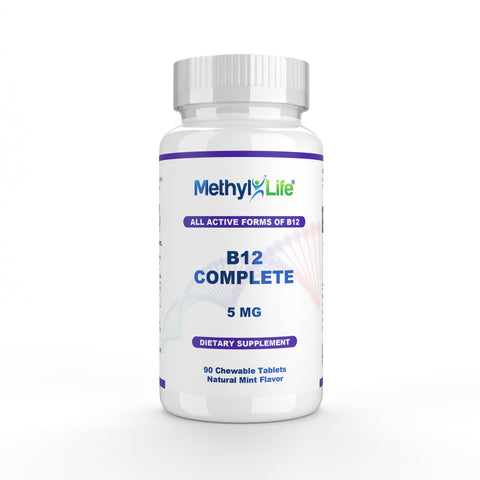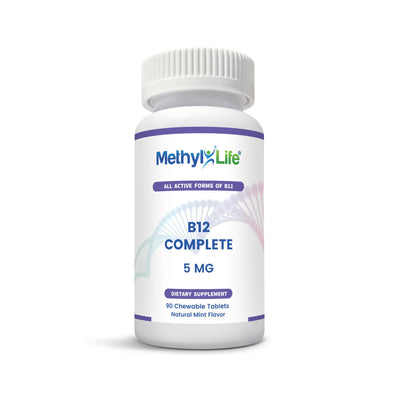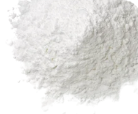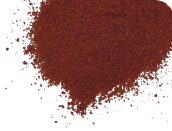Methyl-Life’s® Bioactive Methylcobalamin B12 Complete - 3 Sublingual B12 Bioavailable forms - Vitamin B12 5000 mcg. Bioactive simply means that the B12 has already been converted into a form that your body can immediately use. With these bioactive forms, the B12 does not need to be converted by your genes/enzymes in order to be available for use by your cells (conversion can be a problem for people with MTR, MTRR, COMT as well as other gene defects).
Those with MTHFR are also often found to be low in B12 as well as folate - these are key nutrients for those with genetic challenges.
- Methylcobalamin B12 – Helps with methylation, brain & nerve health, circulatory & immune systems, reduces homocysteine, and positively affects anemia.
- Hydroxy B12 – Helps in pain sensitivity (chronic fatigue, fibromyalgia & COMT mutations may benefit), “brain fog”, detoxifying peroxynitrites or superoxides (bad guys), as well as pernicious anemia. The body converts Hydroxy B12 into Methylcobalamin and Adenosylcobalamin.
- Adenosylcobalamin B12 – Helps in muscle recovery, mitochondrial support, repairing the myelin sheath, and again helps with anemia.
Our chewable form provides for maximum B12 absorption through the mucous membranes in the mouth. Bite the tablet into pieces and allow those to dissolve under your tongue for a sublingual delivery to maximize your body's use of the nutrient.
Methyl-Life’s® Methylcobalamin B-12 Complete Vitamin B12 5000 mcg product was the very first ever to combine all 3 active forms of B12 into a single tablet for effective, full-spectrum activity.
Did you know that recent research shows that taking B12 in a sublingual oral form is more effective for treating B12 deficiencies than actually getting B12 intramuscular shots? It's usually much more convenient and affordable as well - https://pubmed.ncbi.nlm.nih.gov/30632091.
So save your money and tap into the convenience of our easy-to-take tablet to avoid the problems that happen when your vitamin B12 is low.
Dosage
WARNING – How much is right for you to take? Talk to your doctor about what’s best for you. Before you purchase check out our dosage information to learn more about what some doctors recommend. And review our suggested methylation protocol as a potential step by step guide.
Learn more about B12 and the best active forms to take.
We've spent a great deal of time on our formulations and believe they are optimal for a couple key reasons:
-
Superior formula – We chose the sublingual form specifically to ensure the best absorption of the nutrients. It’s a known fact that B12 does not absorb well through the stomach lining (and many have poor gut health complicating things even further with this delivery method). Instead, active B12 is much better absorbed through the mucosa membrane (or under the tongue – sublingually).
- Ideal formula – We have included all 3 of the active forms of B12 into a single product so you can have an optimum daily dose of B12 in an easy to afford product. It's also super convenient to take this tablet with your on-the-go lifestyle, it just melts in the mouth - no water needed.
Dr. Amy Yasko (https://dramyyasko.com/) recommends a specific form of B12 based on your genetics if you know the status of your COMT 158 and VDR Taq variants.
| COMT V158M | VDR Taq | B12 Types That Should Be Tolerated |
|---|---|---|
| – – | + + (TT) | All 3 types of B12 |
| – – | + – (Tt) | All 3 types of B12 with less Methylcobalamin |
| – – | – – (tt) | Hydroxy B12 and Adenosylcobalamin |
| + – | + + | All 3 types of B12 with less Methylcobalamin |
| + – | + – | Hydroxy B12 and Adenosylcobalamin |
| + – | – – | Hydroxy B12 and Adenosylcobalamin |
| + + | + + | Hydroxy B12 and Adenosylcobalamin |
| + + | + – | Hydroxy B12 and Adenosylcobalamin |
| + + | – – | Mostly Hydroxy B12 |
How to snap the tablet in half – See how its done via video. First find the half hash line and face it away from yourself (with the back of the tablet facing your chest/stomach), then put both of your thumbs next to each other along the line (as if there were one on the back of the tablet). You want the half hash line facing away from you (not on the side of the tablet where your thumbs are). And then you should be able to break it in half along that line every time by simply applying pressure to snap it outwards, by pushing your thumbs away from you. This approach works far better than using a pill cutter, which seems to cause the tablet to crumble much more.
SUPPLEMENT FACTS
Bite tablet into pieces, and hold under tongue or between gums and cheek before ingesting.
| SUPPLEMENT FACTS | ||
|
Serving Size: 1 Chewable Tablet
|
||
| 90 servings per container | Amount per Serving | % Daily Value |
| Vitamin B12 | 5,000 mcg (Total) | 208,333% (Total) |
| (as Methylcobalamin 50%) |
2,500 mcg
|
|
| (as Hydroxy B12 25%) |
1,250 mcg
|
|
| (as Adenosylcobalamin 25%) |
1,250 mcg
|
|
Product Does NOT Contain: wheat, gluten, soy, dairy, tree nuts, animal products, GMOs.
FAQ'S
 What if my blood serum B12 level test comes back as high, does that mean I don’t need B12?
What if my blood serum B12 level test comes back as high, does that mean I don’t need B12?
The most important thing to realize is that blood tests for B12 are highly inaccurate at detecting actual cellular levels of B12 (meaning the B12 that’s available for the cells to use). Studies have shown that people can have high or normal B12 levels in the blood and actually show virtually no B12 in the spinal fluid, meaning the B12 is not being transported from the blood stream into the cells where it should be absorbed and used.
 What can you do if you have high B12 blood test results? Dr. Amy Yasko and Nutritionist Cynthia Smith both suggest you can consider taking low dose lithium orotate (Cynthia Smith suggests approximately 4.6 mg pulsed a couple times a week before adding the B12 form in that’s most likely best for you).
What can you do if you have high B12 blood test results? Dr. Amy Yasko and Nutritionist Cynthia Smith both suggest you can consider taking low dose lithium orotate (Cynthia Smith suggests approximately 4.6 mg pulsed a couple times a week before adding the B12 form in that’s most likely best for you).
 What does sublingual mean and why isn’t your product labeled as “sublingual”?
What does sublingual mean and why isn’t your product labeled as “sublingual”?
 My doctor said that because I have MTHFR, I should be taking methylcobalamin as my B12 form, why are you suggesting these other forms too?
My doctor said that because I have MTHFR, I should be taking methylcobalamin as my B12 form, why are you suggesting these other forms too?
One of the most common other nutrients to consider when supplementing the methylation cycle is the proper form of B12. There are 3 different types of B12 that are considered very beneficial to the body (hydroxy B12, methylcobalamin or adenosylcobalamin). Many automatically think that if you have an MTHFR defect, then you need the form of B12 called methylcobalamin, but that is simply NOT true.
It’s important to realize that the MTHFR status does not necessarily determine the type of B12 that’s best for you, instead it’s the status of genes like COMT, MTR, MTRR as well as VDR Taq. It is true that methylfolate and methylcobalamin work together synergistically along the methylation cycle pathway, but that doesn’t necessarily mean that if you tolerate methylfolate well you’ll also need, want or tolerate methylcobalamin well (even if that’s what most doctors, nutritionists, etc. are currently saying right now).
It seems there may be a general lack of education available to most doctors about the different forms of B12 and what those forms are as well as how they get converted within the body and what each is most beneficial for (not to mention which set of genes or genetic mutations could benefit most from which B12 type). So do your homework when it comes to B12 to see which you may tolerate best.
The most common form of B12 that you’ll find everywhere is cyanocobalamin and it is not very active or beneficial to the body because the absorption rate is fairly low, that’s because the body has to convert it first into hydroxy B12, and from there the hydroxy B12 has to be converted into both adenosylcobalamin and methylcobalamin. But if the body has genetic mutations then these conversions don’t happen well at all and the effect is the body does not get the absorption or use of the nutrient.
 I have my 23andme test results, how can I use those to know which form of B12 I might best tolerate?
I have my 23andme test results, how can I use those to know which form of B12 I might best tolerate?
If you have your 23andme genetic test results, you can use those to help guide you as you try the specific B12 forms to see how they do for you. You’ll notice below that, according to Dr. Amy Yasko, the most well tolerated active form of B12 for folks seems to be hydroxy B12. Every single one of the genetic combinations she lists below should be able to tolerate B12 in the form of hydroxy B12 (and this is why our methylation protocol suggests hydroxy B12 as the B12 form to begin with):
- Folks with multiple COMT mutations tend to do very well with hydroxy B12 (it helps mop up excess peroxynitrites which can cause problems)
- Folks with MTR & MTRR mutations may do well with methylcobalamin & adenosylcobalamin supplementation
- And Dr. Amy Yasko (https://dramyyasko.com)talks about folks with a particular mutation status for COMT & VDR Taq as best needing the below forms of B12:
| COMT V158M | VDR Taq | B12 Types That Should Be Tolerated |
|---|---|---|
| – – | + + (TT) | All 3 types of B12 |
| – – | + – (Tt) | All 3 types of B12 with less Methylcobalamin |
| – – | – – (tt) | Hydroxy B12 and Adenosylcobalamin |
| + – | + + | All 3 types of B12 with less Methylcobalamin |
| + – | + – | Hydroxy B12 and Adenosylcobalamin |
| + – | – – | Hydroxy B12 and Adenosylcobalamin |
| + + | + + | Hydroxy B12 and Adenosylcobalamin |
| + + | + – | Hydroxy B12 and Adenosylcobalamin |
| + + | – – | Mostly Hydroxy B12 |
 What is Active B12 Complete?
What is Active B12 Complete?
Active B12 Complete is a supplement containing three fully-bioavailable forms of vitamin B12, providing comprehensive support for energy metabolism, cognitive function, and overall well-being in a convenient chewable form.
 What are the three forms of B12 in Active B12 Complete?
What are the three forms of B12 in Active B12 Complete?
Active B12 Complete includes methylcobalamin, adenosylcobalamin, and hydroxy B12, ensuring maximum absorption and utilization of vitamin B12 by the body for enhanced benefits.
 How should Active B12 Complete be taken?
How should Active B12 Complete be taken?
Follow the guidance of a healthcare professional when taking Active B12 Complete chewable, usually one tablet daily or as necessary to fulfill personal B12 needs. Prior to buying, explore our dosage details to understand recommendations from certain healthcare providers. Additionally, consider reviewing our suggested methylation protocol as a potential step-by-step guide.
 How long does a supply of Active B12 Complete last?
How long does a supply of Active B12 Complete last?
Each purchase of Active B12 Complete provides a three-month supply, offering extended support for maintaining B12 levels and overall health.
 Can Active B12 Complete help with fatigue and low energy levels?
Can Active B12 Complete help with fatigue and low energy levels?
Yes, Active B12 Complete supports energy metabolism and may help alleviate fatigue and low energy levels associated with B12 deficiency or inadequate B12 intake.

















